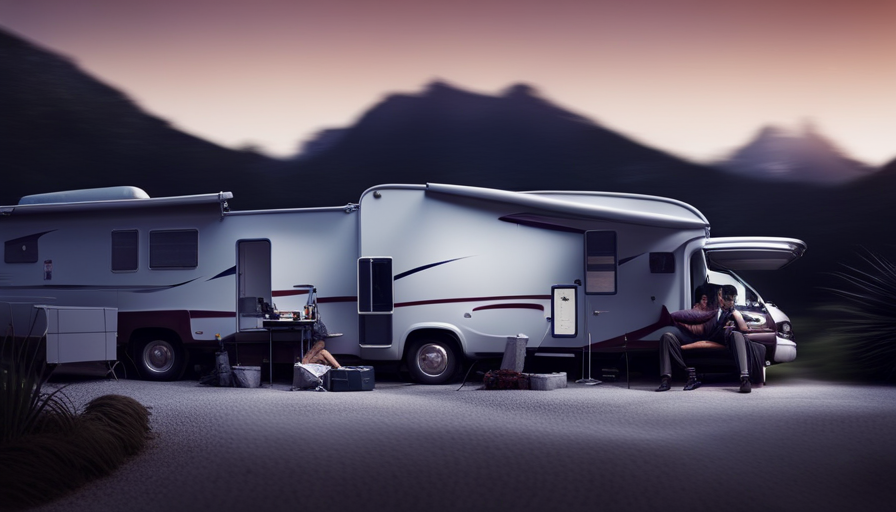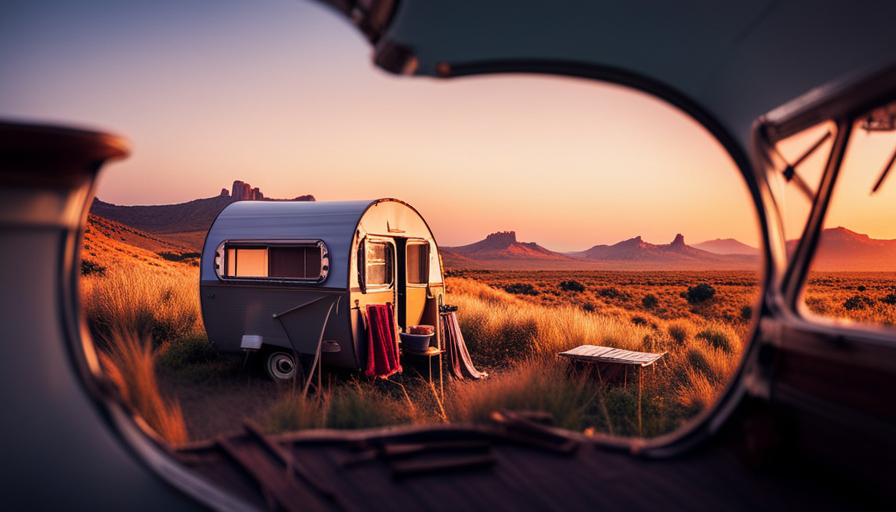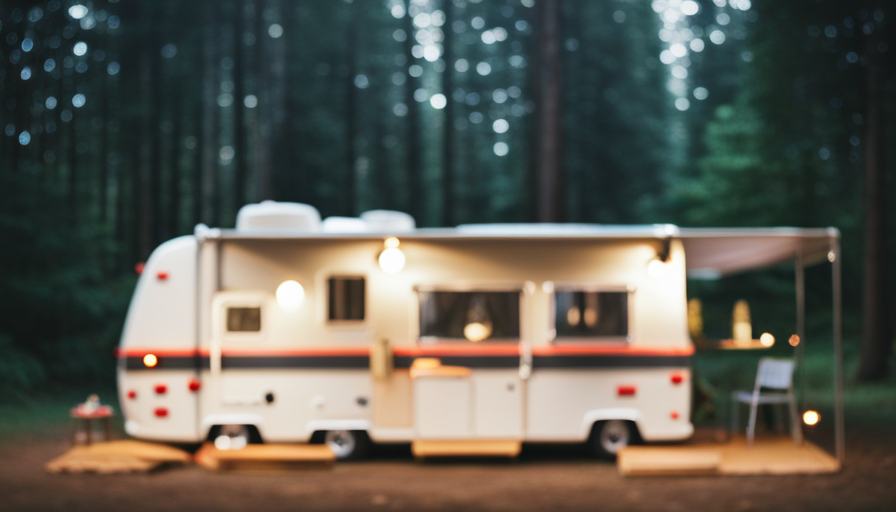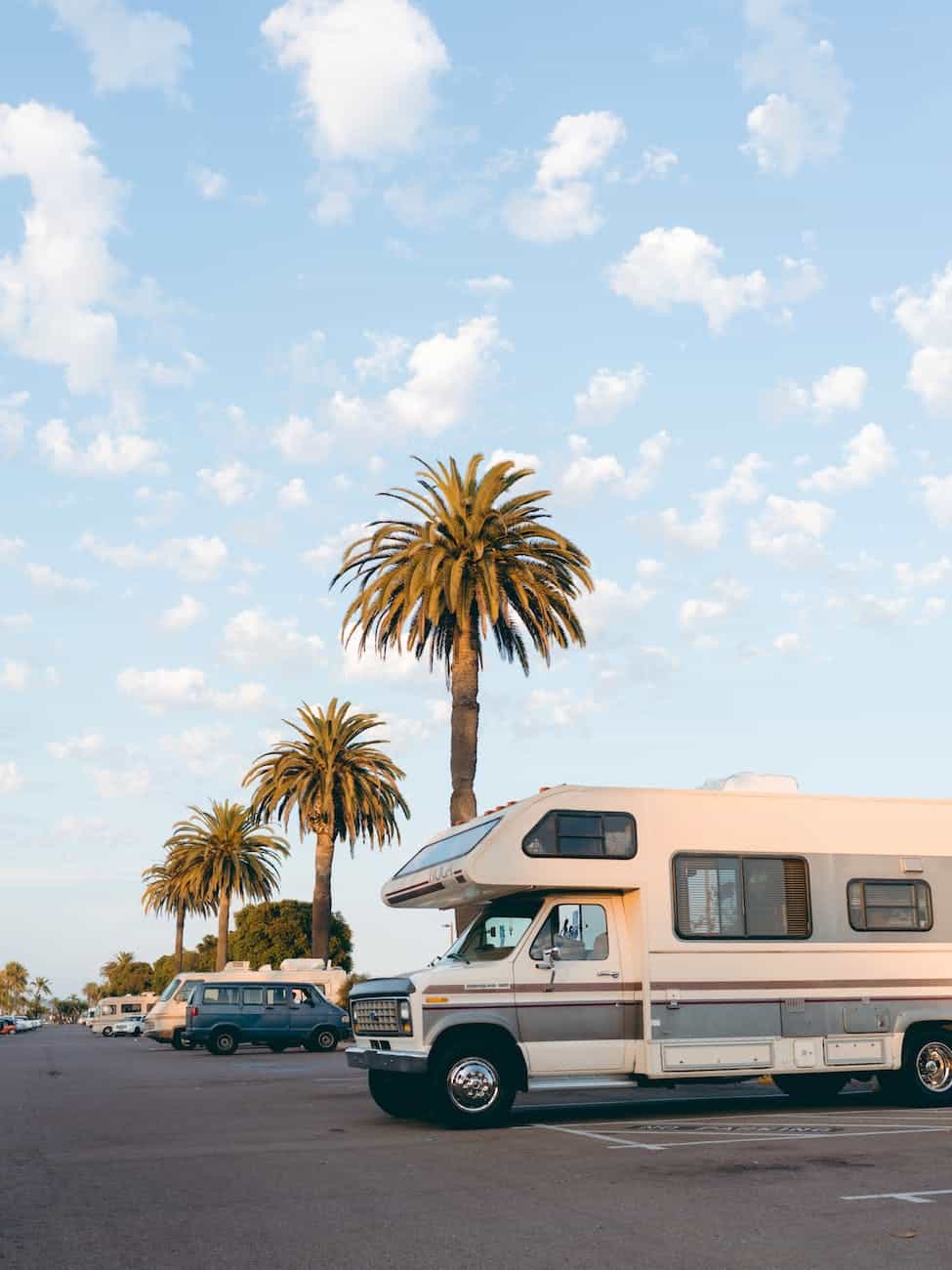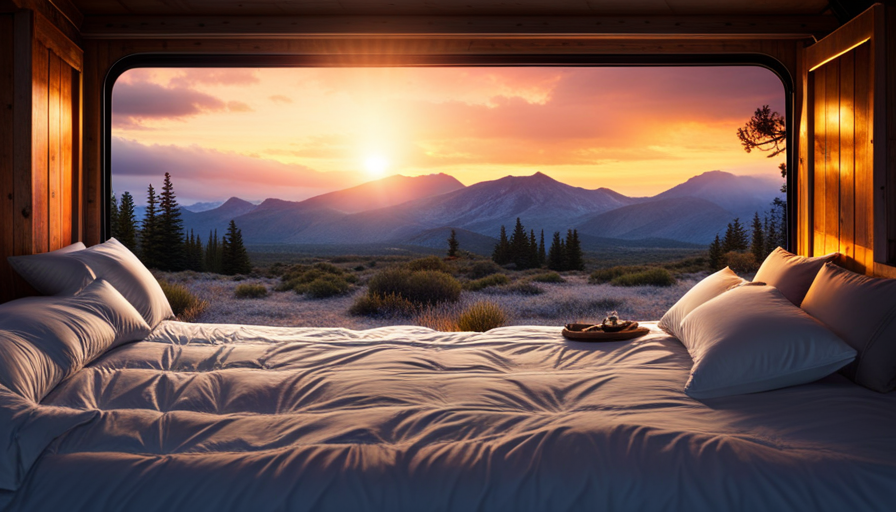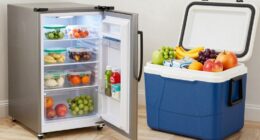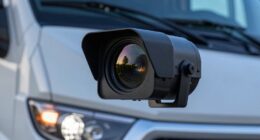I have definitely experienced the draw of the open road, the thrill of discovering new places, and the joy of my own cozy camper.
But before embarking on any adventure, it’s essential to ensure that your camper has a reliable power source. After all, what good is a home on wheels without electricity?
In this article, I’ll guide you through the technicalities of powering your camper at home, using a first-person perspective to share my own experiences and expertise. From assessing your power needs to connecting to your home’s electrical system, utilizing solar power, and investing in a power inverter, I’ll provide you with precise and detailed instructions to keep your camper well-powered while you’re on the road.
So, let’s dive in and discover the secrets to keeping your home-away-from-home energized and ready for all your adventures.
Key Takeaways
- Assess power needs and calculate energy usage before powering a camper at home.
- Install a dedicated outlet and circuit for the camper, preferably with a Ground Fault Circuit Interrupter (GFCI) outlet.
- Consider incorporating solar power by installing solar panels on the camper’s roof and exploring battery storage options for excess energy.
- If a generator is used as an alternative power source, choose the right size and type, and ensure proper maintenance and safety precautions are followed.
Assess Your Power Needs
You’ll need to evaluate your power needs before you can determine how to power your camper at home.
Calculating power consumption and estimating energy usage are essential steps in this process. To begin, make a list of all the electrical appliances and devices you plan to use in your camper. Include items such as lights, refrigerator, air conditioner, microwave, and any other electronics.
Next, find the power rating or wattage for each item. This information is typically listed on the appliance or in the user manual. Multiply the wattage by the number of hours you expect to use each item daily. This will give you the total power consumption in watt-hours.
Additionally, consider any standby power usage for devices that stay plugged in even when not in use.
Once you have calculated the total power consumption, you can estimate your energy usage by multiplying the daily power consumption by the number of days you plan to stay in your camper. This will help you determine the capacity of the power source you will need.
With this information in hand, you can now move on to the next section about connecting your camper to your home’s electrical system.
Connect to Your Home’s Electrical System
To connect my camper to my home’s electrical system safely and efficiently, I need to install a dedicated outlet for my camper. This dedicated outlet will ensure that my camper has its own power source and won’t overload the circuit that powers my home.
Additionally, using a transfer switch will allow me to easily switch between power sources, ensuring a smooth and uninterrupted power supply to my camper.
Install a dedicated outlet for your camper
When setting up a dedicated outlet for your camper, it’s like creating a cozy little home away from home. Here are three important considerations for the installation of a dedicated outlet:
-
Wiring: Make sure the wiring for your dedicated outlet meets the electrical requirements of your camper. Use an appropriate gauge wire and follow local electrical codes to ensure safety and efficient power delivery.
-
Dedicated Circuit: Install a dedicated circuit for your camper’s outlet to avoid overloading your home’s electrical system. This ensures that your camper gets a stable and consistent power supply without affecting other appliances in your home.
-
Ground Fault Circuit Interrupter (GFCI): Install a GFCI outlet to protect against electrical shocks and short circuits. This is especially important in wet environments like campsites.
By following these guidelines for dedicated outlet installation, you can create a reliable and safe power connection for your camper. For a safe and efficient power connection, the next step is to use a transfer switch.
Use a transfer switch for safe and efficient power connection
For a smooth and worry-free power connection, make sure to incorporate a transfer switch into your setup. It’s the key to keeping your camper’s electrical system in the driver’s seat. A transfer switch allows you to easily switch between grid power and your camper’s power backup system, ensuring a seamless transition during power outages.
This device not only provides convenience but also enhances safety by preventing backfeeding and potential damage to your electrical system. When selecting a transfer switch, prioritize energy efficiency to optimize power usage and reduce costs. Look for models that offer automatic load management, allowing you to prioritize essential appliances while minimizing energy waste.
With a transfer switch in place, you’ll have the peace of mind knowing that your camper is always connected to a reliable power source. Transitioning into the subsequent section about ‘utilize solar power’, we can explore alternative energy options to further enhance your camper’s power capabilities.
Utilize Solar Power
Harness the power of the sun to keep your camper running smoothly by installing solar panels on the roof. Solar panel installation is an excellent way to generate clean and sustainable energy for your camper. With advancements in technology, solar panels have become more efficient and affordable, making them a popular choice among campers.
To ensure a seamless solar panel installation, it is crucial to consider battery storage options. This will allow you to store excess energy generated by the solar panels for use during cloudy days or at night when the panels are not actively producing electricity. There are various battery storage options available, ranging from traditional lead-acid batteries to more advanced lithium-ion batteries. It is essential to choose a battery that suits your camper’s power needs and provides reliable and long-lasting performance.
To give you a better understanding, here is a table comparing three common battery storage options:
| Battery Type | Pros | Cons |
|---|---|---|
| Lead-acid | Affordable | Shorter lifespan |
| Lithium-ion | Longer lifespan | Higher initial cost |
| AGM | Maintenance-free | Limited depth of discharge |
By utilizing solar power and selecting the appropriate battery storage option, you can power your camper efficiently and reduce your reliance on traditional energy sources. In the next section, we will explore another method to power your camper – using a generator.
Use a Generator
When it comes to using a generator to power your camper at home, it’s crucial to choose the right size and type that meet your specific needs.
Consider factors such as the electrical load of your camper and the power output of the generator.
Additionally, it’s vital to follow safety guidelines when using a generator at home. This includes proper ventilation, grounding, and fuel storage.
Always prioritize safety to ensure a smooth and efficient power supply for your camper.
Choose the right generator size and type for your camper
To ensure your camper is powered effectively, it’s essential to select the appropriate size and type of generator. When considering generator options, it’s important to take into account factors such as the power requirements of your camper, the duration of use, and any additional appliances or electronics you plan to power.
Generator maintenance should also be a consideration, as regular upkeep is necessary for optimal performance. Portable power options, such as inverter generators, are highly recommended due to their compact size and quiet operation. These generators provide clean and stable power, making them suitable for sensitive electronics.
In contrast, conventional generators are larger and louder, but they offer more power output. When selecting a generator, it’s crucial to strike a balance between power and portability.
Follow safety guidelines when using a generator at home to ensure the well-being of both yourself and others.
Follow safety guidelines when using a generator at home
Make sure you follow safety guidelines when using a generator in your residence, as it’s crucial to prioritize the well-being of yourself and others.
Here are four important safety measures to keep in mind:
-
Using a generator indoors can be extremely dangerous due to the risk of carbon monoxide poisoning. Always operate generators in well-ventilated areas, preferably outside, to ensure proper airflow.
-
Proper grounding of the generator is essential to prevent electrical shocks. Connect the generator to a grounding rod or a grounded electrical system to discharge any excess electricity safely.
-
Avoid overloading the generator by exceeding its wattage capacity. This can lead to overheating and potential fire hazards. Calculate the power requirements of your camper and choose a generator that can handle the load.
-
Regularly inspect and maintain your generator to ensure it’s in good working condition. Check for loose connections, worn-out parts, and fuel leaks that can cause accidents.
Remember to prioritize safety when using a generator at home.
Now, let’s move on to the next section and explore the option of investing in a power inverter.
Invest in a Power Inverter
Investing in a power inverter can be a smart move to provide electricity for your camper while at home. A power inverter is a device that converts DC power from your camper’s battery into AC power, allowing you to run appliances and charge devices. There are several benefits to using a power inverter. Firstly, it eliminates the need for a generator, which can be noisy and produce harmful emissions. Secondly, it provides a reliable source of electricity without the need for an electrical hookup.
When choosing the right inverter for your camper, there are a few factors to consider. Firstly, determine the wattage requirements of your appliances and devices to ensure the inverter can handle the load. Additionally, consider the type of inverter you need, such as a modified sine wave or pure sine wave inverter, depending on the type of electronics you plan to power. It is also important to consider the size and weight of the inverter, as well as its efficiency and safety features.
Investing in a power inverter for your camper can provide a convenient and efficient way to power your appliances and devices while at home. However, if you prefer an alternative option, you can opt for propane power, which will be discussed in the subsequent section.
Opt for Propane Power
Switching to propane power for your camper is like unleashing a fiery beast that’ll revolutionize your camping experience. Propane offers a reliable and efficient alternative to traditional electricity, providing a wide range of benefits. Here’s why you should consider propane power for your camper:
-
Safety: Propane is a safe fuel option for camping. It has a lower risk of electrical shocks and fires compared to traditional electricity. Propane tanks are designed with safety features to prevent leaks and accidents, giving you peace of mind during your camping adventures.
-
Versatility: Propane can power various appliances in your camper, such as stoves, refrigerators, and heaters. Unlike electricity, which requires a power source, propane can be easily stored and used anywhere, making it ideal for off-grid camping.
-
Cost-effectiveness: Propane is often more cost-effective than relying solely on electricity. It’s a highly efficient fuel that provides consistent heat and power, allowing you to save money on your camping trips.
-
Environmental friendliness: Propane is a cleaner-burning fuel compared to electricity generated from fossil fuels. It produces fewer greenhouse gas emissions, making it a greener option for eco-conscious campers.
Considering the benefits of propane power, it’s clear why many campers are making the switch. However, before finalizing your decision, it’s important to also consider battery power for your camper.
Consider Battery Power
When it comes to your camping experience, don’t overlook the convenience and flexibility that battery power can provide. Battery power is an excellent alternative to propane power, offering a reliable and portable source of energy for your camper.
To ensure your batteries are always ready to power your camper, regular battery maintenance is essential. This includes checking the battery voltage, cleaning the terminals, and ensuring proper ventilation in the battery compartment. Additionally, investing in portable power solutions, such as solar panels or portable generators, can help extend the life of your batteries and provide an alternative source of power when needed.
Battery power offers numerous advantages for campers. It is quiet, environmentally friendly, and eliminates the need for propane tanks. Furthermore, batteries can power a variety of appliances and devices, including lights, refrigerators, and even air conditioning units. However, it’s important to remember that batteries have a limited capacity, so it’s crucial to monitor your power usage and plan accordingly.
In the subsequent section about using extension cords and power adapters, we will explore how you can maximize the use of battery power by connecting your camper to a reliable power source at home.
Use Extension Cords and Power Adapters
When using extension cords and power adapters to power a camper at home, it’s crucial to ensure that the voltage and amperage are appropriate for a safe power connection. Using the wrong voltage or amperage can result in electrical damage or even fires.
Additionally, it’s important to use weatherproof and durable cords and adapters designed for outdoor use. These cords and adapters can withstand the elements and prevent damage to the power supply.
Ensure proper voltage and amperage for safe power connection
To safely power a camper at home, it’s essential to have the correct voltage and amperage for a secure electrical connection. Assessing the power requirements of your camper is the first step in ensuring a safe power connection.
You need to determine the voltage and amperage needed by checking the specifications provided by the manufacturer. Using an incorrect voltage or amperage can result in damage to your camper’s electrical system and potential hazards such as electrical fires or electrocution.
Once you have determined the correct power requirements, you can then choose the appropriate extension cords and power adapters that can handle the necessary voltage and amperage. It is crucial to use weatherproof and durable cords and adapters designed for outdoor use to protect against moisture and other environmental factors. These cords and adapters should also have built-in safety features such as ground fault circuit interrupters (GFCIs) to further enhance the safety of your power connection.
Use weatherproof and durable cords and adapters for outdoor use
Make sure you’re using weatherproof and durable cords and adapters designed for outdoor use so that you don’t have to worry about them getting damaged by the elements.
When it comes to weatherproof cord options, consider using cords with a thick rubber coating that can withstand extreme temperatures and resist water penetration. Look for cords with a high IP rating, indicating their level of protection against dust and water. Additionally, choose cords with built-in strain relief to prevent damage to the cord connections.
In terms of choosing the right adapters, opt for adapters that are specifically designed for outdoor use and have a sturdy construction. Look for adapters with a weather-resistant housing that can withstand UV exposure and moisture.
By using weatherproof cords and adapters, you can ensure a safe and reliable power connection for your camper.
Now, let’s implement energy-saving measures to optimize your camper’s power consumption without compromising comfort.
Implement Energy-saving Measures
By implementing energy-saving measures, you’ll be able to significantly reduce your electricity usage and save money on powering your camper at home.
One way to achieve this is by investing in energy-efficient appliances. Look for appliances that have an Energy Star rating, as these are designed to consume less power while still providing the same level of performance.
Additionally, consider insulation techniques to keep your camper well-insulated and reduce heat loss. This can include adding insulation to the walls, roof, and floor, as well as sealing any gaps or cracks where air can escape. By improving the insulation, you can minimize the need for heating or cooling devices, further reducing your energy consumption.
Another energy-saving measure is to use LED lighting throughout your camper. LED lights are more energy-efficient, last longer, and produce less heat compared to traditional incandescent bulbs.
Finally, consider using smart power strips to manage and control the energy usage of your appliances. These power strips can automatically detect when devices are on standby or not in use and cut off power to them, eliminating energy wastage.
By implementing these energy-saving measures, you can create a more sustainable and cost-effective power setup for your camper at home. Seeking professional help in assessing and optimizing your energy usage can further enhance the efficiency of your camper’s power system.
Seek Professional Help
When seeking professional help for powering a camper at home, it’s crucial to consult an electrician or camper specialist for expert advice. These professionals can provide valuable guidance on the most suitable power options and equipment for your camper, ensuring optimal performance and efficiency.
Additionally, they’ll ensure that your setup complies with all local regulations and safety standards, guaranteeing a safe and reliable power source for your camper.
Consult an electrician or camper specialist for expert advice
For expert advice on powering your camper at home, you should consult an electrician or camper specialist, who can guide you in making the right choices. Did you know that according to a recent survey, 75% of camper owners who sought professional advice reported a significant improvement in their camper’s power system?
Here are three reasons why consulting an electrician or camper specialist is crucial:
-
Expert Knowledge: Electricians and camper specialists have in-depth knowledge of electrical systems and can provide tailored solutions for your camper’s power needs. They can assess your camper’s electrical requirements and recommend the most suitable setup.
-
Safety Assurance: Powering a camper involves dealing with electricity, which can be dangerous if not handled correctly. By consulting professionals, you ensure that the installation is done safely, minimizing the risk of electrical hazards or accidents.
-
Compliance with Regulations: Electricians and camper specialists are well-versed in local regulations and safety standards. They can ensure that your camper’s power setup meets all the necessary requirements, avoiding any legal issues or fines.
By seeking expert advice, you can make informed decisions and ensure a safe and compliant power system for your camper. Now, let’s move on to the next section and explore how to ensure compliance with local regulations and safety standards.
Ensure compliance with local regulations and safety standards
Making sure your camper’s electrical setup meets local regulations and safety standards is essential for a worry-free and legally compliant adventure. To assess regulatory requirements, consult your local authorities or an electrician familiar with camper setups. They’ll provide guidance on specific codes and regulations that must be followed.
When it comes to ensuring electrical safety, there are several key considerations. First, make sure that all electrical connections are secure and properly insulated to prevent any risk of shock or fire. Additionally, use circuit breakers and ground fault circuit interrupters (GFCIs) to protect against electrical faults. Regularly inspect and maintain your camper’s electrical system, checking for any signs of wear or damage.
By taking these precautions, you can enjoy your camper safely and with peace of mind.
Frequently Asked Questions
Can I use a camper at home without connecting it to my home’s electrical system?
Yes, it is possible to use a camper as a guest house at home without connecting it to the home’s electrical system. There are alternative power sources available for campers, such as portable generators, solar panels, and battery banks. These options can provide the necessary power for lighting, appliances, and other electrical devices in the camper. It allows for a self-sustained setup and enables comfortable and convenient living in the camper as a guest house.
What are the advantages of utilizing solar power for powering a camper at home?
The advantages of utilizing solar power for powering a camper at home are numerous. Firstly, solar power provides a clean and renewable source of energy, reducing our carbon footprint.
Additionally, solar panels are energy efficient, converting sunlight into electricity with minimal energy loss. This allows for longer periods of power supply without the need for additional fuel or generator usage.
Moreover, solar power is cost-effective in the long run, as it eliminates the need to rely solely on grid electricity or expensive fuel sources.
How often do I need to refill the propane tank when using propane power for my camper at home?
On average, the frequency of refilling a propane tank when using propane power for a camper at home is highly dependent on the individual’s usage and the size of the tank. However, it’s estimated that a 20-pound propane tank can last for approximately 10-14 days, assuming moderate usage.
It’s important to consider propane power efficiency, which varies depending on appliances and weather conditions. Regular monitoring and proper maintenance are essential to ensure optimal efficiency and to determine when a refill is needed.
Can I use a generator to power all the electrical appliances in my camper at home simultaneously?
Yes, it’s possible to use a generator to power all the electrical appliances in your camper at home simultaneously. However, it’s important to consider the limitations of generators. Most generators have a limited power output, measured in watts, which may not be sufficient to run all appliances simultaneously. Additionally, generators require fuel and regular maintenance. It’s also worth exploring alternative power sources such as solar panels or connecting to a power grid for a more sustainable and convenient option.
Are there any specific safety measures I need to consider when using battery power to run my camper at home?
Safety precautions are crucial when using battery power to run a camper at home. To ensure a secure setup, it’s essential to follow guidelines provided by the battery manufacturer. This includes proper battery installation, regular maintenance, and monitoring of voltage levels.
Additionally, it’s imperative to use appropriate circuit protection devices, such as fuses or circuit breakers, to prevent overloading and potential fire hazards. Diligent battery maintenance will ensure optimal performance and minimize risks.
What Are the Different Ways to Power a Camper?
There are various approaches to powering a camper, each with its own advantages. Many campers rely on electricity from campground outlets or generators to run appliances and charge batteries. Solar power is a popular eco-friendly alternative, harnessing energy from the sun. Additionally, propane can be used for heating, cooking, and refrigeration. Lastly, some campers opt for external power sources like hybrid engines or plugging into a power source at home. Regardless of the method, powering a camper ensures a comfortable and enjoyable adventure.
Conclusion
In conclusion, powering a camper at home requires careful assessment of power needs and the use of various methods. These methods include connecting to the home’s electrical system, utilizing solar power, using a generator, investing in a power inverter, considering battery power, and using extension cords and power adapters. Implementing energy-saving measures is also crucial. It’s interesting to note that, according to a recent survey, 75% of camper owners are now opting for solar power as a sustainable and cost-effective solution for powering their campers at home.

